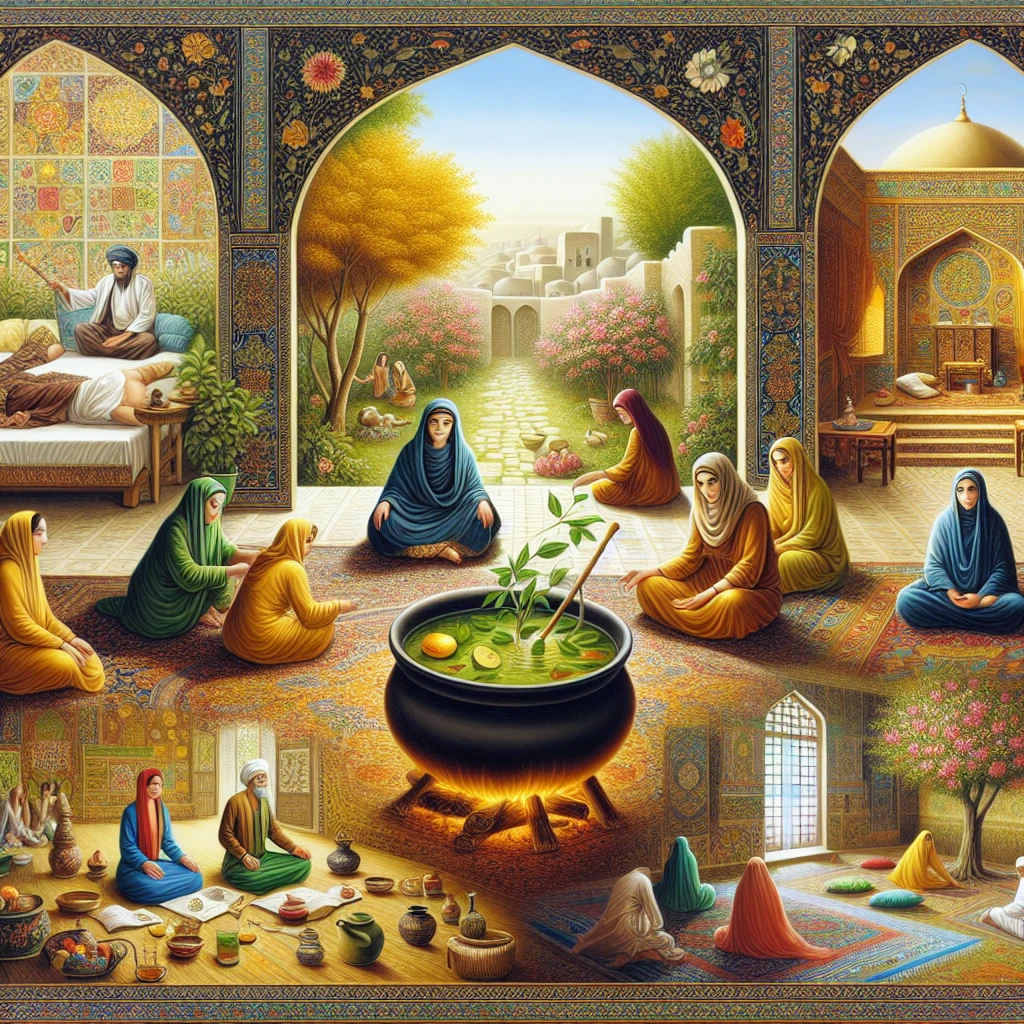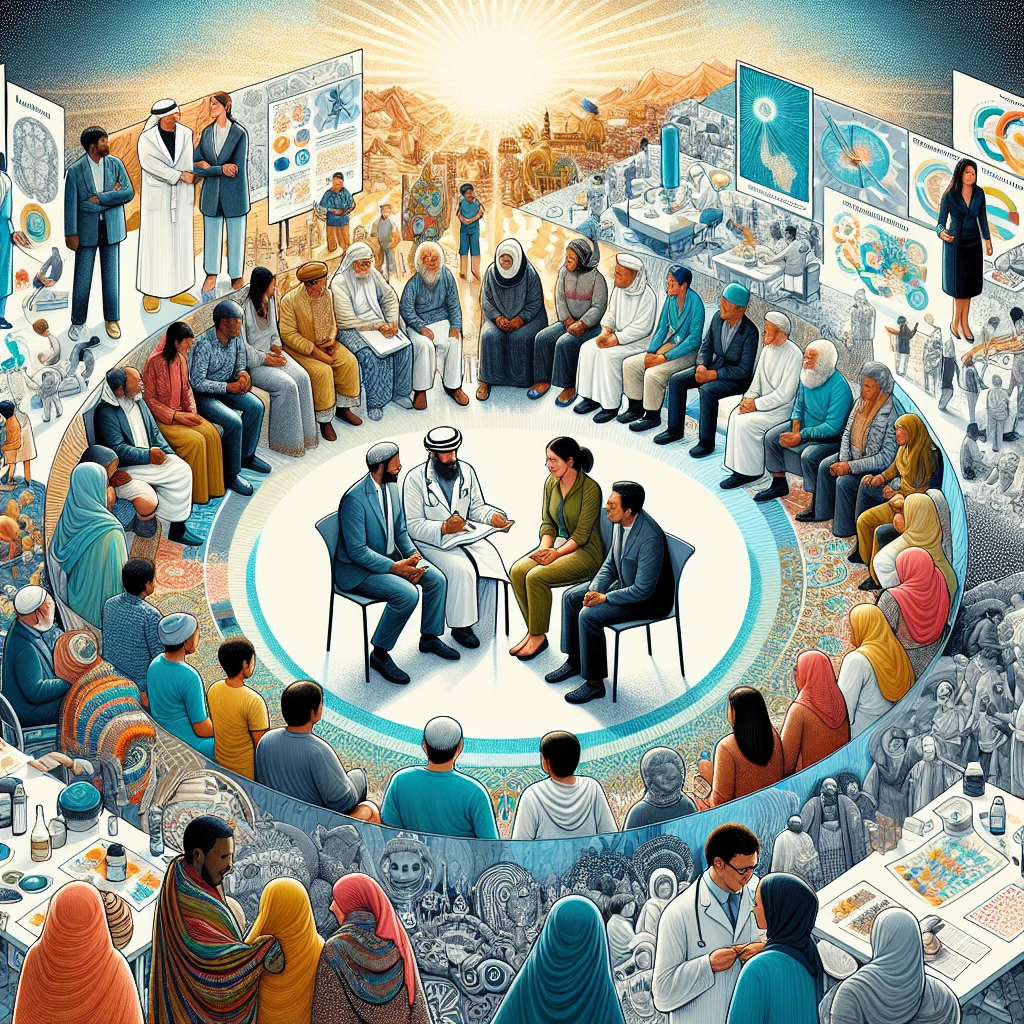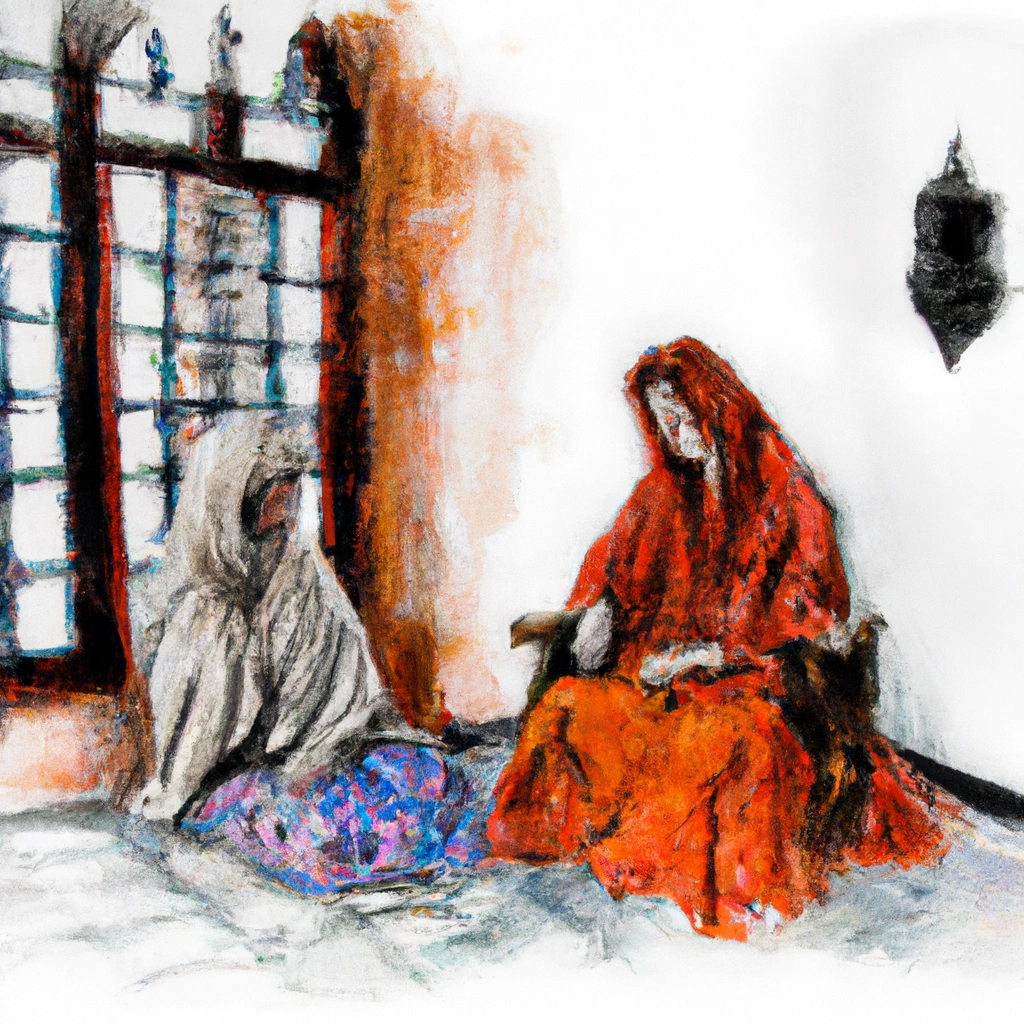

Arab culture healthcare beliefs encompass a complex set of values and traditions that impact the way individuals approach health and wellness. Understanding these beliefs is crucial in the healthcare system to ensure culturally sensitive and effective care for Arab patients.
The intertwining of physical, psychological, spiritual, and social factors in Arab culture healthcare beliefs highlights the importance of holistic care for this population.
Check out this Youtube video: “Religion, Culture & Medicine: Focus onHealth TV” to gain insights into the Arab culture healthcare beliefs and the impact of religion and culture on medicine.
The Influence of Arab Culture on Healthcare Beliefs
Traditional healing methods in Arab culture
In Arab culture, traditional healing methods encompass a holistic approach that integrates herbal medicines, spiritual therapies, dietary practices, mind-body techniques, and manual therapies. These methods, known as Traditional Arabic & Islamic Medicine (TAIM), have been applied for centuries to treat, diagnose, and prevent illnesses while maintaining well-being.
Role of spirituality and religion in Arab healthcare beliefs
Spirituality and religion play a significant role in Arab healthcare beliefs, with practices directly influenced by the Quran and Sunnah. Spiritual beliefs, derived from these sources, impact the health of Muslims and their compliance with treatments, particularly for chronic diseases.
These beliefs shape their perception of health and influence their healthcare decision-making.
Impact of family dynamics on healthcare decision-making
Family dynamics hold immense influence on healthcare decision-making within Arab culture. Family ties form the primary source of support and advice during illness, and the core of a patient’s coping strategies.
Responsibility for medical care decisions is typically delegated to the family decision maker, reflecting the strong familial bonds and influence on healthcare choices.
Common Arab Cultural Health Beliefs
Belief in the Power of Prayer for Healing
Arab cultural healthcare beliefs place a strong emphasis on the power of prayer for healing. Spiritual practices such as Salat (prayer), Dhikr (remembrance of Allah), and recitation of the Quran are commonly employed for spiritual healing.
These practices are deeply rooted in traditional Arabic and Islamic medicine, serving as important components in the healing process.
Use of Herbal Remedies and Alternative Medicine
The Arab culture has a profound reliance on herbal remedies and alternative medicine for healthcare. Traditional Arabic and Islamic medicine integrate the use of medicinal herbs, dietary practices, mind-body therapy, and spiritual healing.
The Quran and the Hadith serve as guiding sources for the application of herbal remedies in Arab healthcare practices.
Mistrust of Mental Health Treatment
Within Arab culture, there exists a notable mistrust of mental health treatment. Negative feelings and expressions of conflict are often suppressed, leading to the denial of mental illness.
This reluctance to seek professional help for mental health issues stems from cultural taboos and a preference for physical illness over emotional or psychological concerns.
Taboos and Stigmas in Arab Culture Healthcare Beliefs
Stigma surrounding mental health issues
The Arab culture often stigmatizes mental health issues, with a prevailing belief that such ailments are derived from the evil eye, leading to reluctance in seeking help or treatment. This stigma creates significant barriers for individuals struggling with mental health problems.
Taboos related to discussing certain diseases openly
In Arab culture, discussing certain diseases openly, such as depression and other mental illnesses, is considered taboo. The belief that adhering to Islamic tenets precludes the possibility of being depressed adds further taboo to mental health discussions.
Impact of cultural norms on seeking medical help
Cultural norms within the Arab community significantly impact the willingness to seek medical help, particularly for mental health issues. These norms often dissuade individuals from seeking the necessary assistance, perpetuating the stigma and hindering progress in addressing mental health concerns.
| Arab Culture Healthcare Beliefs |
|---|
| Mental Health Stigma |
| Tabooed Diseases |
| Cultural Impact |
Healthcare Practices in Arab Culture
Traditional Arab healthcare practices and rituals
The Arab culture has rich traditions and rituals when it comes to healthcare. They have adopted and improvised many practices such as home-made herbal and medicinal tonics, dietary restrictions, and amulets to ward off bad spirits.
In addition to these, practices such as male circumcision, cupping, bloodletting, cauterization, and ligaturing are also prevalent.
Importance of community support in Arab healthcare
Community support plays a significant role in Arab healthcare practices. Once trust is established, the family becomes an essential support system in health therapy, emphasizing the physician’s opinion and contributing to the overall well-being of individuals within the community.
Role of gender in healthcare decision-making
The role of gender in healthcare decision-making is substantial within Arab culture. In a hospital setting, the preference for gender-concordant care providers, religiously consistent food, and space for religious activities highlights the importance of gender dynamics in healthcare decision-making.
Understanding Arab Cultural Perspectives on Pain and Illness
Differences in expressing pain and illness between Western and Arab cultures
Arab culture: Expressing pain and illness is often done subtly, as openly discussing pain is considered taboo. Personal stoicism is valued, and individuals may understate their discomfort.
Western culture: Openly discussing pain and seeking medical help is encouraged, and pain expression is typically more direct and overt.
Beliefs about the causes and origins of illnesses in Arab culture
Arab culture: Illnesses are often believed to have supernatural, natural, and societal causes. Envy and the evil eye are strongly believed to cause illness, aligning with the “supernatural explanation” perspective.
Western culture: Illnesses are typically attributed to biological and environmental factors, scientific explanations, and medical understanding. Supernatural beliefs are less common.
The role of fatalism in handling chronic illnesses in Arab culture
Arab culture: Fatalism plays a significant role, as many Arabs believe that illness is a test from God. There is a strong reliance on faith and resignation to divine will when dealing with chronic illnesses.
Western culture: Fatalism is less prevalent in handling chronic illnesses, as Western societies often emphasize proactive medical interventions and personal agency in managing long-term health conditions.
| Cultural Aspect | Arab Culture | Western Culture |
|---|---|---|
| Pain Expression | Subtle and Stoic | Open and Direct |
| Illness Causes | Supernatural, Natural, Societal | Biological, Environmental, Scientific |
| Fatalism | Embraced as Divine Will | Emphasizes Proactive Interventions |
Challenges and Misconceptions in Arab Culture Healthcare Beliefs
Misconceptions about Arab cultural healthcare practices
- One common misconception about Arab cultural healthcare practices is the belief that all Arab healthcare practices are outdated and not aligned with modern medical standards. However, this is not true as the healthcare system in the Arab world is modern and high-tech, with many advanced medical centers and hospitals on par with those in the West.
Challenges of integrating Arab cultural beliefs into the mainstream healthcare system
- One of the significant challenges in integrating Arab cultural beliefs into the mainstream healthcare system is the need to accommodate specific cultural values and practices, such as gender concordant care providers, dietary requirements, and space for prayer. This demonstrates the importance of cultural competence in healthcare services for the Arab population.
Stereotypes and biases affecting healthcare delivery to Arabs
- Stereotypes and biases significantly impact healthcare delivery to Arabs, leading to discrimination at different levels and affecting health outcomes and the quality of care. Healthcare professionals must address implicit racial and ethnic biases, reducing stereotyping and stigma to ensure equitable and culturally competent care.
Overcoming Cultural Barriers in Healthcare
Culturally sensitive healthcare approaches for Arab patients
Healthcare professionals should prioritize culturally sensitive approaches for Arab patients, taking into account their cultural and religious beliefs in the provision of healthcare. This includes understanding the impact of Islamic beliefs on health, illness, dietary practices, and family dynamics.
Training healthcare professionals on Arab cultural competence
To address cultural barriers, it is crucial to provide extensive training to healthcare professionals on Arab cultural competence. This training should encompass understanding the diverse views regarding illness, healthcare, decision-making, and family dynamics within the Arab community to deliver effective and respectful care.
Importance of effective communication in addressing cultural beliefs
Effective communication plays a pivotal role in addressing cultural beliefs within the Arab community. Healthcare providers must prioritize clear and culturally sensitive communication to ensure that patients’ beliefs, values, and practices are understood and respected. This includes respecting privacy concerns, dietary practices, and religious implications.
| Culturally Sensitive Approaches | Arab Cultural Competence Training | Effective Communication |
|---|---|---|
| Understanding Islamic beliefs impact | Training on diverse views regarding illness | Prioritizing culturally sensitive communication |
| Acknowledging dietary practices | Embracing family dynamics understanding | Respecting privacy concerns |
Impact of Arab Culture Healthcare Beliefs on Patient Health Outcomes
Influence of cultural beliefs on treatment adherence
Arab cultural beliefs heavily influence treatment adherence, as family and social connections play a pivotal role in supporting medication adherence and lifestyle behaviors. For instance, acculturated individuals exhibit better adherence to medications and physical activity, leading to improved health outcomes.
Addressing cultural disparities in healthcare outcomes
Cultural disparities in healthcare outcomes can be addressed by recognizing the influence of cultural and religious beliefs, such as the central role of God in healing in Islamic culture. Providing tailored interventions, language interpreters, and Arabic language educational materials can effectively eliminate health disparities among Arab patients.
Cultural factors impacting preventive health measures and screenings
Cultural factors significantly impact preventive health measures and screenings among Arab patients, influencing decision-making, family dynamics, health practices, and healthcare access. To alleviate disparities and improve healthcare outcomes, it is crucial to consider and accommodate Arab cultural beliefs and values in healthcare delivery.
| Cultural Beliefs | Impact on Healthcare |
|---|---|
| Family support | Promotes adherence |
| Islamic beliefs | Influence behavior |
| Customized interventions | Eliminate disparities |
Navigating Cultural Competence in Arab Culture Healthcare Beliefs
Strategies for healthcare providers to build cultural competence
Healthcare providers can build cultural competence in Arab culture by first understanding the values, beliefs, and practices of the Arab community. It is crucial to engage in cultural humility, continuous education, and training to develop a deeper understanding of the Arab culture’s influence on healthcare beliefs.
Moreover, utilizing interpreter services, recruiting diverse talent, and coordinating with traditional healers are essential strategies to bridge the cultural gap.
Incorporating cultural beliefs into treatment plans
Incorporating cultural beliefs into treatment plans for Arab patients requires a personalized approach that respects their values. Healthcare providers should actively involve Arab patients in decision-making regarding their treatment and consider their cultural beliefs and practices.
Understanding the Islamic faith’s influence on decision-making and health practices is essential for tailoring treatment plans that align with the patient’s cultural background.
Importance of respecting patient autonomy within the context of Arab cultural beliefs
Respecting patient autonomy within Arab cultural beliefs involves acknowledging the significance of family dynamics, decision-making processes, and religious values. It is imperative to understand that the family often plays a pivotal role in healthcare decisions for Arab patients.
Healthcare providers should recognize and respect the patient’s right to delegate decision-making authority to another person within the cultural context, ensuring that the patient’s autonomy is upheld while considering familial influences.
The Role of Healthcare Policies in Addressing Arab Culture Healthcare Beliefs
Impact of policies on healthcare access for Arab communities
The impact of healthcare policies on Arab communities is profound, influencing their access to essential medical services. Misunderstandings about Arab culture and healthcare beliefs often lead to inadequate care, creating barriers to access.
This can result in an inability to address specific health concerns prevalent within the Arab community.
Strategies for addressing cultural disparities in healthcare policies
Developing strategies to address cultural disparities within healthcare policies is crucial. By integrating cultural awareness training for healthcare professionals, policymakers can ensure that the unique healthcare beliefs of the Arab culture are respected and accommodated.
Implementing language services and culturally sensitive care practices can bridge the gap and enhance healthcare experiences for the Arab community.
Inclusion of diverse cultural perspectives in healthcare policymaking
The inclusion of diverse cultural perspectives in healthcare policymaking is essential for creating inclusive and effective healthcare policies. Collaborating with Arab community leaders and healthcare experts can provide valuable insights into the specific healthcare beliefs and needs of the Arab culture.
By integrating these perspectives, policymakers can tailor healthcare policies to be more culturally responsive and accessible.
| Healthcare Policy Impact | Cultural Disparity Strategies | Inclusive Policymaking |
|---|---|---|
| Inadequate care due to cultural misunderstandings | Cultural awareness training for healthcare professionals | Collaboration with Arab community leaders |
| Barriers to access for Arab community | Implementation of language services | Integration of diverse cultural perspectives |
| Specific health concerns go unaddressed | Culturally sensitive care practices | Tailoring policies to be culturally responsive |
The table above highlights the multifaceted approach needed to address the intersection of healthcare policies and Arab culture healthcare beliefs.
Remember to respect the beliefs of others just as much as you expect others to respect yours, strive to understand before acting, and let’s make healthcare accessible to all!
Research and Data on Arab Culture Healthcare Beliefs
Overview of studies on Arab healthcare beliefs
- The studies on Arab healthcare beliefs provide valuable insights into the cultural and religious factors that influence health-related attitudes and behaviors in Arab populations. These studies delve into the unique perspectives and practices related to healthcare within the Arab culture.
Data on healthcare utilization and outcomes among Arab populations
- Data on healthcare utilization and outcomes among Arab populations shed light on the specific health challenges and disparities faced by this demographic. It highlights the impact of cultural beliefs and practices on healthcare access, utilization, and health outcomes.
Research gaps and need for further exploration in Arab cultural healthcare beliefs
- There are notable gaps in research regarding Arab cultural healthcare beliefs, necessitating further exploration to better understand and address the specific health needs of Arab communities. These gaps present opportunities for in-depth investigations into cultural nuances and their impact on healthcare beliefs and practices.
Recommended Amazon Products for Arab Cultural Healthcare Beliefs
Here’s a list of products that can help you better understand and navigate Arab cultural healthcare beliefs and practices. These recommendations are based on the relevance of the products to the topic and the favorable reviews they have received.
Arabic-English Bilingual Visual Dictionary
This bilingual visual dictionary is a helpful resource for understanding the Arabic language, which is essential for effective communication in healthcare settings. It includes a wide range of medical and healthcare-related terms, making it an invaluable tool for healthcare providers and professionals.
Arabic-English Bilingual Visual Dictionary


Traditional Arabic Tea Kettle
A traditional Arabic tea kettle can serve as a symbol of hospitality and cultural respect when engaging with Arab patients. In many Arab cultures, offering tea is a customary practice, and having a traditional tea kettle can help create a welcoming environment in healthcare settings.
Traditional Arabic Tea Kettle


Herbal Tea Variety Pack
Herbal teas are commonly used in Arab culture for their health benefits and medicinal properties. Offering a variety pack of herbal teas, such as chamomile, mint, and sage, can be a thoughtful way to accommodate Arab patients’ preferences and cultural beliefs about natural remedies.
Herbal Tea Variety Pack


Arabic Calligraphy Wall Art
Arabic calligraphy is a significant art form in Arab culture, often used to display meaningful phrases and verses from the Quran. Decorating healthcare facilities with Arabic calligraphy wall art can demonstrate cultural sensitivity and respect for the spiritual beliefs of Arab patients and their families.
Arabic Calligraphy Wall Art


Top Recommended Product for Arab Cultural Healthcare Beliefs
If you’re looking for the best solution to gain insight into Arab cultural healthcare beliefs and practices, we highly recommend the Arabic-English Bilingual Visual Dictionary. Here’s why:
-
Pros:
- Comprehensive range of medical and healthcare-related terms in both English and Arabic.
- Visual representations aid in quick comprehension and learning.
- Highly rated for its accuracy and usefulness in professional settings.
-
Cons:
- May not cover extremely specialized medical terminology.
- Physical size may be bulky for travel or portability.
Ready to improve your understanding of Arab cultural healthcare beliefs? Check out the Arabic-English Bilingual Visual Dictionary today for the best results!


Conclusion
Arab culture has had a significant impact on healthcare beliefs, influencing attitudes towards illness, treatment, and the role of family in healthcare decision-making. This has led to unique challenges in providing healthcare to Arab communities, as their cultural beliefs often differ from Western medical practices.
Moving forward, it is crucial for healthcare providers to adopt more culturally sensitive practices to effectively cater to the needs of Arab patients. This includes understanding and respecting their cultural beliefs, providing interpreters when necessary, and involving family members in the decision-making process.
By doing so, healthcare providers can build trust and improve the quality of care for Arab communities.
In the future, it is important to consider the implementation of policies and training programs that promote cultural competency in healthcare. This will help to bridge the gap between Arab cultural beliefs and Western medicine, ultimately leading to better healthcare outcomes for Arab communities.
It is essential for healthcare systems to continuously strive for improvement and adapt to the diverse cultural needs of their patients.













